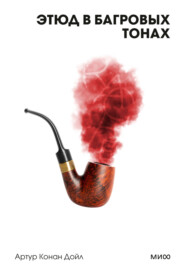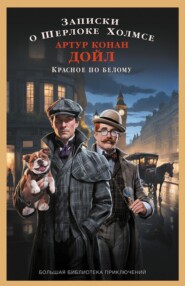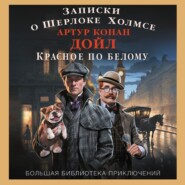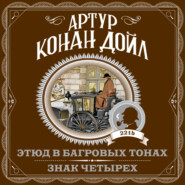По всем вопросам обращайтесь на: info@litportal.ru
(©) 2003-2024.
✖
The Great Shadow and Other Napoleonic Tales
Настройки чтения
Размер шрифта
Высота строк
Поля
That was the most that I ever heard him confess of his past life, and he only shook his head and laughed when we tried to get something more out of him. There were times when we thought that he was but a clever impostor; for what could a man of such influence and talents be loitering here in Berwickshire for? But one day there came an incident which showed us that he had indeed a history in the past.
You will remember that there was an old officer of the Peninsula who lived no great way from us, the same who danced round the bonfire with his sister and the two maids. He had gone up to London on some business about his pension and his wound money, and the chance of having some work given him, so that he did not come back until late in the autumn. One of the first days after his return he came down to see us, and there for the first time he clapped eyes upon de Lapp. Never in my life did I look upon so astonished a face, and he stared at our friend for a long minute without so much as a word. De Lapp looked back at him equally hard, but there was no recognition in his eyes.
"I do not know who you are, sir," he said at last; "but you look at me as if you had seen me before."
"So I have," answered the Major.
"Never to my knowledge."
"But I'll swear it!"
"Where then?"
"At the village of Astorga, in the year '8."
De Lapp started, and stared again at our neighbour.
"Mon Dieu, what a chance!" he cried. "And you were the English parlementaire? I remember you very well indeed, sir. Let me have a whisper in your ear."
He took him aside and talked very earnestly with him in French for a quarter of an hour, gesticulating with his hands, and explaining something, while the Major nodded his old grizzled head from time to time. At last they seemed to come to some agreement, and I heard the Major say "Parole a'honneur" several times, and afterwards "Fortune de la guerre," which I could very well understand, for they gave you a fine upbringing at Birtwhistle's. But after that I always noticed that the Major never used the same free fashion of speech that we did towards our lodger, but bowed when he addressed him, and treated him with a wonderful deal of respect. I asked the Major more than once what he knew about him, but he always put it off, and I could get no answer out of him.
Jim Horscroft was at home all that summer, but late in the autumn he went back to Edinburgh again for the winter session, and as he intended to work very hard and get his degree next spring if he could, he said that he would bide up there for the Christmas. So there was a great leave-taking between him and Cousin Edie; and he was to put up his plate and to marry her as soon as he had the right to practise. I never knew a man love a woman more fondly than he did her, and she liked him well enough in a way – for, indeed, in the whole of Scotland she would not find a finer looking man – but when it came to marriage, I think she winced a little at the thought that all her wonderful dreams should end in nothing more than in being the wife of a country surgeon. Still there was only me and Jim to choose out of, and she took the best of us.
Of course there was de Lapp also; but we always felt that he was of an altogether different class to us, and so he didn't count. I was never very sure at that time whether Edie cared for him or not. When Jim was at home they took little notice of each other. After he was gone they were thrown more together, which was natural enough, as he had taken up so much of her time before. Once or twice she spoke to me about de Lapp as though she did not like him, and yet she was uneasy if he were not in in the evening; and there was no one so fond of his talk, or with so many questions to ask him, as she. She made him describe what queens wore, and what sort of carpets they walked on, and whether they had hairpins in their hair, and how many feathers they had in their hats, until it was a wonder to me how he could find an answer to it all. And yet an answer he always had; and was so ready and quick with his tongue, and so anxious to amuse her, that I wondered how it was that she did not like him better.
Well, the summer and the autumn and the best part of the winter passed away, and we were still all very happy together. We got well into the year 1815, and the great Emperor was still eating his heart out at Elba; and all the ambassadors were wrangling together at Vienna as to what they should do with the lion's skin, now that they had so fairly hunted him down. And we in our little corner of Europe went on with our petty peaceful business, looking after the sheep, attending the Berwick cattle fairs, and chatting at night round the blazing peat fire. We never thought that what all these high and mighty people were doing could have any bearing upon us; and as to war, why everybody was agreed that the great shadow was lifted from us for ever, and that, unless the Allies quarrelled among themselves, there would not be a shot fired in Europe for another fifty years.
There was one incident, however, that stands out very clearly in my memory. I think that it must have happened about the February of this year, and I will tell it to you before I go any further.
You know what the border peel castles are like, I have no doubt. They were just square heaps built every here and there along the line, so that the folk might have some place of protection against raiders and mosstroopers. When Percy and his men were over the Marches, then the people would drive some of their cattle into the yard of the tower, shut up the big gate, and light a fire in the brazier at the top, which would be answered by all the other Peel towers, until the lights would go twinkling up to the Lammermuir Hills, and so carry the news on to the Pentlands and to Edinburgh. But now, of course, all these old keeps were warped and crumbling, and made fine nesting places for the wild birds. Many a good egg have I had for my collection out of the Corriemuir Peel Tower.
One day I had been a very long walk, away over to leave a message at the Laidlaw Armstrongs, who live two miles on this side of Ayton. About five o'clock, just before the sun set, I found myself on the brae path with the gable end of West Inch peeping up in front of me and the old Peel tower lying on my left. I turned my eyes on the keep, for it looked so fine with the flush of the level sun beating full upon it and the blue sea stretching out behind; and as I stared, I suddenly saw the face of a man twinkle for a moment in one of the holes in the wall.
Well I stood and wondered over this, for what could anybody be doing in such a place now that it was too early for the nesting season? It was so queer that I was determined to come to the bottom of it; so, tired as I was, I turned my shoulder on home, and walked swiftly towards the tower. The grass stretches right up to the very base of the wall, and my feet made little noise until I reached the crumbling arch where the old gate used to be. I peeped through, and there was Bonaventure de Lapp standing inside the keep, and peeping out through the very hole at which I had seen his face. He was turned half away from me, and it was clear that he had not seen me at all, for he was staring with all his eyes over in the direction of West Inch. As I advanced my foot rattled the rubble that lay in the gateway, and he turned round with a start and faced me.
He was not a man whom you could put out of countenance, and his face changed no more than if he had been expecting me there for a twelvemonth; but there was something in his eyes which let me know that he would have paid a good price to have me back on the brae path again.
"Hullo!" said I, "what are you doing here?"
"I may ask you that," said he.
"I came up because I saw your face at the window."
"And I because, as you may well have observed, I have very much interest for all that has to do with the military, and, of course, castles are among them. You will excuse me for one moment, my dear Jack."
And he stepped out suddenly through the hole in the wall, so as to be out of my sight.
But I was very much too curious to excuse him so easily. I shifted my ground swiftly to see what it was that he was after. He was standing outside, and waving his hand frantically, as in a signal.
"What are you doing?" I cried; and then, running out to his side, I looked across the moors to see whom he was beckoning to.
"You go too far, sir," said he, angrily; "I didn't thought you would have gone so far. A gentleman has the freedom to act as he choose without your being the spy upon him. If we are to be friends, you must not interfere in my affairs."
"I don't like these secret doings," said I, "and my father would not like them either."
"Your father can speak for himself, and there is no secret," said he, curtly. "It is you with your imaginings that make a secret. Ta, ta, ta! I have no patience with such foolishness."
And without as much as a nod, he turned his back upon me, and started walking swiftly to West Inch.
Well, I followed him, and in the worst of tempers; for I had a feeling that there was some mischief in the wind, and yet I could not for the life of me think what it all meant. Again I found myself puzzling over the whole mystery of this man's coming, and of his long residence among us. And whom could he have expected to meet at the Peel Tower? Was the fellow a spy, and was it some brother spy who came to speak with him there? But that was absurd. What could there be to spy about in Berwickshire? And besides, Major Elliott knew all about him, and he would not show him such respect if there were anything amiss.
I had just got as far as this in my thoughts when I heard a cheery hail, and there was the Major himself coming down the hill from his house, with his big bulldog Bounder held in leash. This dog was a savage creature, and had caused more than one accident on the countryside; but the Major was very fond of it, and would never go out without it, though he kept it tied with a good thick thong of leather. Well, just as I was looking at the Major, waiting for him to come up, he stumbled with his lame leg over a branch of gorse, and in recovering himself he let go his hold of the leash, and in an instant there was the beast of a dog flying down the hillside in my direction.
I did not like it, I can tell you; for there was neither stick nor stone about, and I knew that the brute was dangerous. The Major was shrieking to it from behind, and I think that the creature thought that he was hallooing it on, so furiously did it rush. But I knew its name, and I thought that maybe that might give me the privileges of acquaintanceship; so as it came at me with bristling hair and its nose screwed back between its two red eyes, I cried out "Bounder! Bounder!" at the pitch of my lungs. It had its effect, for the beast passed me with a snarl, and flew along the path on the traces of Bonaventure de Lapp.
He turned at the shouting, and seemed to take in the whole thing at a glance; but he strolled along as slowly as ever. My heart was in my mouth for him, for the dog had never seen him before; and I ran as fast as my feet would carry me to drag it away from him. But somehow, as it bounded up and saw the twittering finger and thumb which de Lapp held out behind him, its fury died suddenly away, and we saw it wagging its thumb of a tail and clawing at his knee.
"Your dog then, Major?" said he, as its owner came hobbling up. "Ah, it is a fine beast – a fine, pretty thing!"
The Major was blowing hard, for he had covered the ground nearly as fast as I.
"I was afraid lest he might have hurt you," he panted.
"Ta, ta, ta!" cried de Lapp. "He is a pretty, gentle thing; I always love the dogs. But I am glad that I have met you, Major; for here is this young gentleman, to whom I owe very much, who has begun to think that I am a spy. Is it not so, Jack?"
I was so taken aback by his words that I could not lay my tongue to an answer, but coloured up and looked askance, like the awkward country lad that I was.
"You know me, Major," said de Lapp, "and I am sure that you will tell him that this could not be."
"No, no, Jack! Certainly not! certainly not!" cried the Major.
"Thank you," said de Lapp. "You know me, and you do me justice. And yourself, I hope that your knee is better, and that you will soon have your regiment given you."
"I am well enough," answered the Major; "but they will never give me a place unless there is war, and there will be no more war in my time."
"Oh, you think that!" said de Lapp with a smile. "Well, nous verrons! We shall see, my friend!"
He whisked off his hat, and turning briskly he walked off in the direction of West Inch. The Major stood looking after him with thoughtful eyes, and then asked me what it was that had made me think that he was a spy. When I told him he said nothing, but he shook his head, and looked like a man who was ill at ease in his mind.
CHAPTER VIII.
THE COMING OF THE CUTTER
I never felt quite the same to our lodger after that little business at the Peel Castle. It was always in my mind that he was holding a secret from me – indeed, that he was all a secret together, seeing that he always hung a veil over his past. And when by chance that veil was for an instant whisked away, we always caught just a glimpse of something bloody and violent and dreadful upon the other side. The very look of his body was terrible. I bathed with him once in the summer, and I saw then that he was haggled with wounds all over. Besides seven or eight scars and slashes, his ribs on one side were all twisted out of shape, and a part of one of his calves had been torn away. He laughed in his merry way when he saw my face of wonder.
"Cossacks! Cossacks!" said he, running his hand over his scars. "And the ribs were broke by an artillery tumbril. It is very bad to have the guns pass over one. Now with cavalry it is nothing. A horse will pick its steps however fast it may go. I have been ridden over by fifteen hundred cuirassiers A and by the Russian hussars of Grodno, and I had no harm from that. But guns are very bad."
"And the calf?" I asked.

















